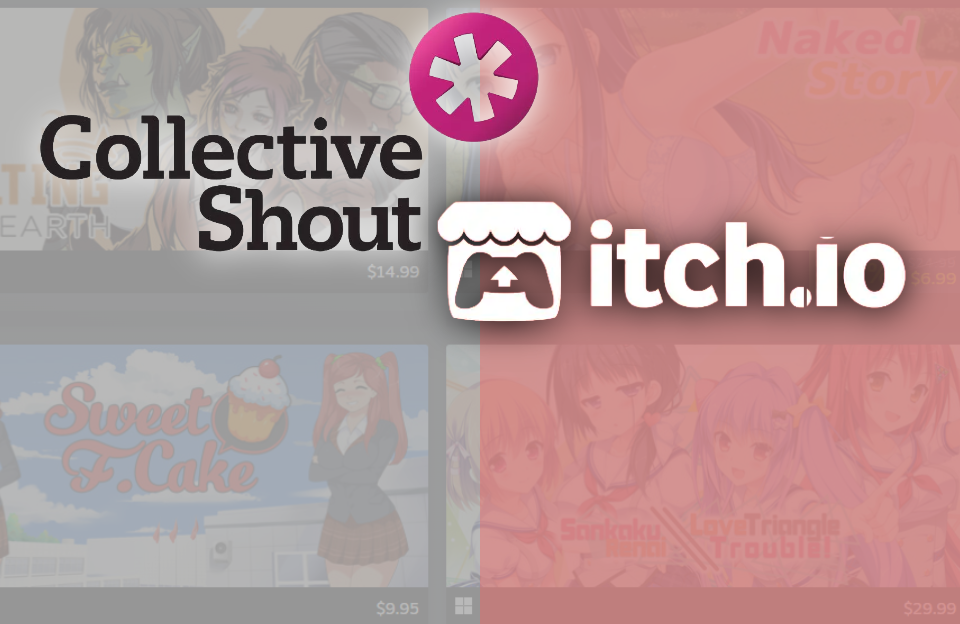Collective Shout’s recent campaign against video game marketplaces opens a dangerous pathway for customers
Video games have never been exempt from controversy. From Punch-Out’s depictions of characters to the violent nature of games like Mortal Kombat and Grand Theft Auto, there seems to be a never-ending faucet of criticism of how video games interpret and simulate morally questionable behaviors. Regardless of the standing of these moral arguments, there comes a point where the fight might cause harm that is more serious.
Recently, an Australian activist group named Collective Shout has taken responsibility for actions taken by online video game marketplaces, namely Itch.io and Steam, to delist and deindex games that contain Not Safe for Work (NSFW) content and Adult themes. They did this by applying pressure to the marketplace’s payment processors. In a statement posted on the group’s website, “We approached payment processors because Steam did not respond to us.”
This statement is accompanied by a timeline of events that detail each step in the group’s campaign. According to this timeline, this all began when they were notified by an unnamed “Male gamer” about a game that was available for purchase on Steam titled “No Mercy.” The game in question takes form as a visual novel type game, with the ability to make conversation choices to steer the story in different desired paths. The game’s protagonist begins by taking pictures of his step/mom (the game gives you the ability to decide whether she is of blood relation to the protagonist) as she has an affair. The game spirals into a multitude of different choices, all leading to whether the sex scene at the end of the game is mutual or forced.
It is this aspect of the game that lead Collective Shout to begin their campaign against Steam. On top of this game, the group found nearly 500 other games that had similar themes and content available for purchase on Steam. After multiple attempts at communicating with the company, Collective Shout’s demands went largely ignored. It was at this point that they decided to take things to the next level: it was time to target the money.
The group began an email campaign targeting payment processors. In a statement uploaded to the group’s website on March 26th, they described the primary payment processors on Steam, which includes companies such as Visa, Mastercard and Paypal, as “quite happy to take a cut from hundreds of rape, incest, and child-abuse themed games.”
It was after this that Steam began implementing a new policy that forbid content being uploaded to Steam that “may violate the rules and standards set forth by Steam’s payment processors and related card networks and banks, or internet service providers.” The specified that adult only games particularly fulfilled this new category.
After Steam’s new policy took effect on July 16th, popular indie video game website Itch.io followed suit after receiving similar scrutiny for games with themes involving rape and incest. This led to the deindexing of over 20,000 games available on the website, which Collective Shout specifies was a decision made by the website, saying that “Our objections were to content that involved s*xualised violence and torture of women.”
These events had led to a raucous response from some in the gaming community, with some attempting to counter-lobby the payment processors. An open letter template on Reddit obtained by TheGamer has been used to contact Visa, describing the companies decisions as “Draconian impositions.”
Visa has since responded to some that have contacted support, saying, “While we explicitly prohibit illegal activity on our network, we are equally committed to protecting legal commerce.” They also say that they don’t moderate content that merchants sell. However, some have taken issue with this, seeing as Steam’s new policy explicitly lays out that content uploaded to the marketplace must abide by the rules and regulations of Steam’s payment processors.
While we patiently wait for more developments on this story, it is important to look at the implications a move like this has. Of course, when it comes to games that depict these morally reprehensible acts, there comes into question the morality of the product being available. These arguments stretch all the way back to when the first Doom game was blamed for the Columbine High School Massacre. The arguments against the availability of these games virtually boil down normalization of the actions depicted.
However, this has been shown time and time again to be a flawed argument. You will hear from nearly every video game player that, just because you can commit violent acts in a game, it doesn’t mean that the gamer wants to go out and commit those same violent acts on the general public. The American Psychological Association has stated that, “There is insufficient evidence to support a causal link between violent video games and violent behavior.”
Instead, studies specify a link to aggressive behavior, such as yelling or pushing. The problem that we face is the confusion between aggression and violence. It is best to see the relationship between the two terms as an instance of the square-rectangle rule, being all violence is aggression, but not all aggression is violence.
Now, this is not to say that games like No Mercy should be given the time of day. No Mercy is more or less an example of fetishization, which, in controlled and safe environments where there is consensual activity happening, is normal (notice the use of the words normal, and not good or bad.) Just like how there are certain pornographic categories that people dislike, as long as there it is consensual and no harm is being done, it is hard to argue that it should be banned.
This leads to the real problem that events such as these promote. The banning of these types of video games leads us down a slippery slope. When we begin to restrict and outlaw things based on “moral” standings, we start to see the bans that promote actual harm and marginalization. Morality is subjective and differs from person to person. The line on what can be and what can’t be banned starts to become blurry when we subject it to people’s moral principles. How far do we go before we start to see restrictions on LGBTQ+ characters or historical accuracy?
If you would like more information regarding the campaign being led by Collective Shout, you can go to their website to find out more.
More by Aaron



